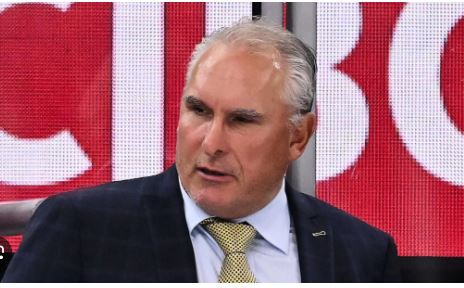
Mitch Marner and the Toronto Maple Leafs Must Work Together to Get an Extension
Recently, there has been more talk about the Leafs’ star winger possibly signing an extension. Team and player concessions can result in a win-win situation for all parties.
The attention turned to star winger Mitch Marner’s status as soon as the Toronto Maple Leafs’ latest playoff disappointment ended.
Most people agree that the Toronto Maple Leafs need to trade for a key player in order to reorganize their roster. For many, it makes the most sense to send Marner somewhere else.

The team has already signed long-term extensions with William Nylander and Auston Matthews, and Marner’s contract is up for renewal in 2019.
Aside from the fact that no team has ever won a trade like this, Marner’s no-movement clause is the biggest obstacle to the Leafs making a trade. He added that he has no desire to move away from Toronto. General manager of the Leafs Brad Treliving is now in a difficult situation.
Difficulties Might Persuade the Leafs That a Marner Extension Is the Best Choice
The suggestion in a recent report that Treliving would prefer to extend than trade Marner shouldn’t come as a surprise.
Treliving made a smart decision in investigating the possibility of an extension with Marner. If he didn’t investigate the possibility, he wouldn’t be performing his job.
Matters are complicated by Marner’s no-movement clause. He would have to approve every purchase. Should Treliving comb the trade market and not find a deal that pleases him or Marner, then it’s a delicate matter. That would be awkward for everyone, taking offers, finding nothing in the end, and then having Marner come back.
Treliving’s options are severely limited by Marner’s requirement to approve every move. The Leafs won’t receive nearly fair value for a player of Marner’s caliber if he has only a few select teams (or none) that he would consider.
Teams won’t be as willing to part with a ton of assets for maybe just a single season of Marner’s services, especially with free agency approaching in the summer.
Combining those elements, Treliving and the Leafs may determine that Marner’s extension is the best option.
Here’s What the Toronto Maple Leafs and Mitch Marner Look Like After a Cordial Extension
Marner should be flexible in his contract negotiations if his expressed desire to stay with the Maple Leafs is true.
Although Marner acknowledges it comes with the job, he occasionally finds the attention from Toronto and the scrutiny surrounding the Leafs to be draining. He is also aware of the pedestals that participants in this market are placed on.
His philanthropic foundation is well-known in the city. Remaining with his hometown team would make it simpler for him to handle.
If he were to sign an extension with the Leafs now rather than waiting until the summer to test the free agent market, the salary difference would be offset by off-ice endeavors such as his foundation and endorsement deals.
The Leafs believe that this is the ideal moment to begin negotiating a long-term contract for Marner. Treliving can use the frustration of Leafs supporters and a lackluster postseason as leverage.
Marner, who played fewer games than normal last season, is also recovering from an injury.
Now is a better time to negotiate a team-friendly contract than it will be next summer. If Marner becomes a free agent, he will receive a sizable offer from someone, regardless of whether he suffers an injury or has a poor season. There will be intense competition for his services. It will get harder to get a new deal with the Leafs, particularly if Marner has a strong season.
Marner ought to be amenable to a three- to five-year contract if he is determined to stay with the Leafs. That would give him one more shot at a lucrative contract as a free agent in the future.
He might receive a contract from the Leafs that has the same AAV as Nylander’s. There is an equal hierarchy behind Matthews, according to the underlying message. That would remove any possibility of conflict resulting from a pay disparity.
If someone is thinking that’s too much, think about how important Marner is to Matthews and how he plays both ways. In addition, as years pass and the NHL salary cap rises, the percentage hit will decrease. When John Tavares’ contract expires in the summer of 2020, the Leafs will also have more cap space.
The Leafs would still be able to assemble a team around Matthews, Nylander, and Marner because of their financial flexibility. For three elite players, about $36 million is not excessive.
Leave a Reply